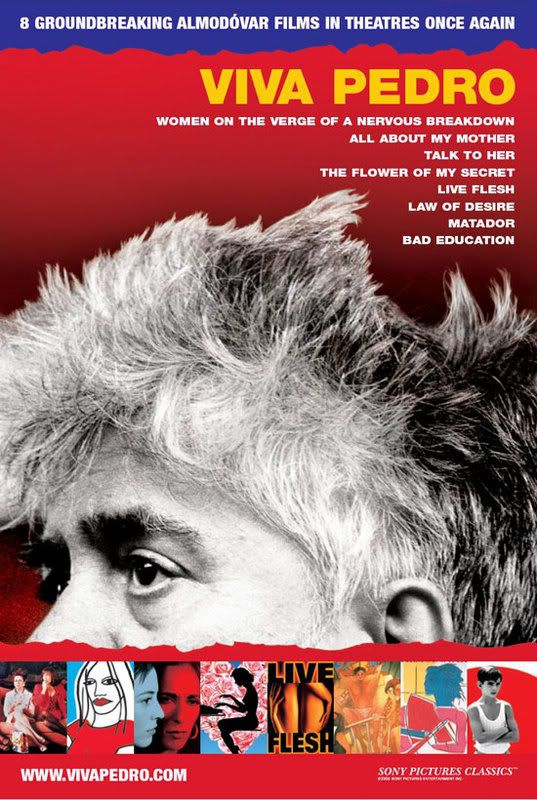Viva Pedro Part Two: All About My Mother
 Viva Pedro: Part Two
Viva Pedro: Part TwoAll About My Mother ***1/2
It is only Pedro Almodovar who fully understands the way that women talk, act, and are around one another. His female characters, between this and "Women on the Verge of a Nervous Breakdown," are all so rich and detailed, doing things that actual women would do under these circumstances, capturing little conversations between them as only a master director can really do. And this is why everything that I've seen by him is a successful, because when it comes to characters, Almodovar always shines through.
"All About My Mother," released in 1999, is the second film in the eight week series "Viva Pedro." It is the story of many mothers, but mostly Manuela, who lives alone with her son, Esteban. Esteban wants to be a writer, and he also wants to know the true secret of his father, who his mother never talks about. The two have a wonderful relationship, until running after a theatre actress to get an autograph, Esteban is struck down by a car and is killed. His body is put to some use, when a man on the donor list recieves Esteban's heart. Manuela cannot stay where she is anymore. It is simply too much torment, so she decides to go on a journey to find Esteban's father, and tell him two things: that she had his child, and that he is dead. However, her journey begins to loose focus once she arrives in Madrid, and finds old friends and is introduced to new ones. Like Sister Rosa, who is pregnant and may or may not have AIDS. Or Huma, the actress that Esteban wanted to get the autograph from, and Huma's fellow actress Nina, who is always messed up on some drug or the other to even be able to focus straight. Manuela soon becomes the personal assitent to Huma, and the caregiver to Rosa, whose pregnant has left her ill. Her quest to find the father of the child she lost leads her to become a mother figure to someone who needs it the most.
Pedro Almodovar loves women. And the bulk of his characters, at least in the films that I have seen, are either women, or are men who want to be women. He knows exactly what to do with every female character that he creates. And his stories always tackle the unusual, and the darkness of life. "All About My Mother" is indeed a dark story, but in a different way from "Women on the Verge of a Nervous Breakdown." This story is more human. It is not as screwball as the latter. Cecilia Roth completely inhabiants the character of Manuela. She lost her purpose when her son died, and now she has to find something that brings it back. And so she helps everybody that she has the chance too. Even though she is the main character here, the film doesn't rely solely on her preformance. Mainly, how all the characters relate to one another is important, because without that, the core of the film is not there. This isn't a one women show. The film's main highlights are when the women are just sitting there talking to one another. About life, about love, about sex, about each other. A second thing that Almodovar is trademarked for is his photography. Out of the three films I've seen by him, this is probably his most true to life. And yet, his settings and photographs transport you to a world of the strange and bizarre. Where everything is bright, and oddly solid. And even though everything looks fake and hand made, is seems like real life. Almodovar has the power to make these strange settings feel like home, because his chracters are always as real as can be.
"Viva Pedro" continues next week with "Talk to Her."

0 Comments:
Post a Comment
Subscribe to Post Comments [Atom]
<< Home